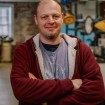Chad Risko Creates New Materials Using Computational Chemistry
Chad Risko, an assistant professor of chemistry in the University of Kentucky College of Arts and Sciences, didn’t always know there was a career to be had in doing research — until a mentor encouraged him to study chemistry as an undergraduate.
“From there, and when I went to graduate school, is where I think the research bug really took hold,” Risko said. “Being in the lab, working with people, trying to understand ways of solving problems — that really motivated me to pursue a career in research.”
Now, as a chemistry professor and affiliated researcher in UK’s Center for Applied Energy Research (CAER), Risko says mentoring students has become one of the most fulfilling parts of his job.
“Working with undergraduate and graduate students and seeing them progress as scientists, watching them learn to be better thinkers and gain new knowledge as they move forward — for me, that’s one of the biggest things I really appreciate about being a researcher.”
Risko was recently recognized for his role as a teacher-scholar, being named a 2018 Cottrell Scholar by the Research Corporation for Scientific Advancement. He also received a 2018 Office of Naval Research Young Investigator Award a few weeks later.
"These two awards clearly show that Dr. Risko is among the best young chemistry investigators in the nation," said Mark Meier, chair of UK's Department of Chemistry. "We are proud to count him as a member of our team, and are thankful he is sharing his knowledge with students in our classrooms and through his laboratory work.”
For many, the idea of a chemist brings about images of someone working behind a bench in a white lab coat, mixing chemicals together in beakers. Risko, who studies computational and theoretical materials, says that’s not the case — his chemistry is done on a computer.
“We try to take knowledge from quantum mechanics, classical mechanics, chemistry, material science and engineering and bring it all together to provide a really fundamental understanding of new synthetic materials that are of interest for electronics applications, for energy conversion and energy storage,” he said.
The chemistry of batteries, from small lithium ion batteries to large grid-scale storage, is one of the major topics he and his team study. Risko helps his colleagues from across disciplines design new materials that they may then use in their own labs. By starting at the atomic level, Risko and his team use computer simulations to examine the different possibilities of a material. They are then able to share this information with their colleagues and make recommendations to them.
“Our goal, in the end, is to help our colleagues design new materials,” he said.
Risko, who came to UK in 2014, says collaborating with colleagues across campus has taken his research in directions he would not have otherwise imagined. But the students are what ultimately drew him to pursue a career in academia.
“They’re what brings a university alive,” he said. “I’ve been very fortunate to have students from different physical sciences, and different departments in the College of Engineering, come and perform research in the lab. They all bring their expertise and distinctive questions. So, I think, for someone coming here to do research, I would say be open to the collaborations. Be open to people knocking on your door, asking questions. Be open to the people.”





